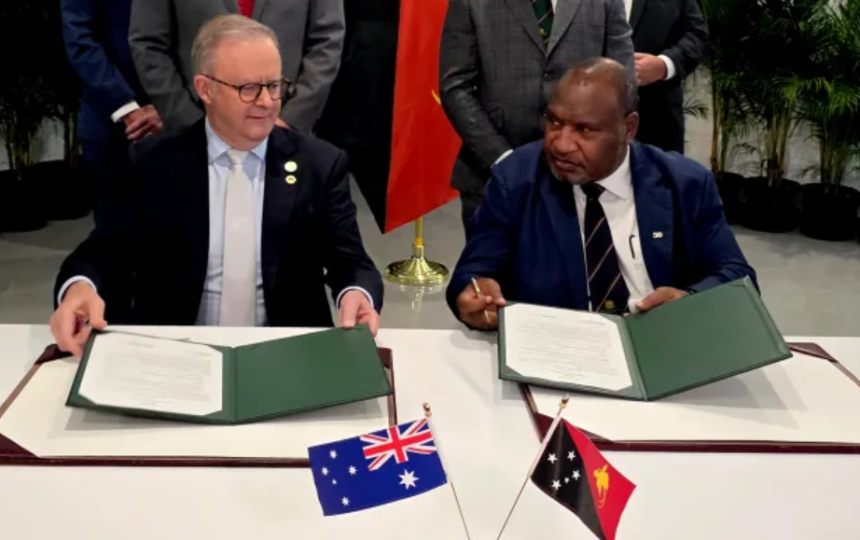What’s Going On
China has issued a warning to Papua New Guinea (PNG) over its plan to enter into a mutual defence treaty with Australia, known as the Pukpuk Treaty. Chinese officials said any such agreement should not be “exclusive in nature” or restrict PNG from cooperating with other countries. They also cautioned that the treaty should not target any third party or undermine their legitimate rights and interests.
The warning comes shortly after Australian Prime Minister Anthony Albanese visited Port Moresby and confirmed that the text of the treaty had been agreed, only for the formal signing to be delayed due to procedural issues in PNG’s cabinet.
Key Details of the Treaty & Delay
- The Pukpuk Treaty would mark a major shift: the two countries would mutually defend each other in the event one is attacked, strengthen military cooperation, and allow citizens of one country to serve in the other’s defence force.
- However, during Albanese’s visit on 17 September, the treaty was not signed. PNG’s cabinet did not have a quorum, preventing final approval. Instead, both leaders signed a communique that reaffirms their commitment, with expectations that the treaty will be finalized in the coming weeks.
China’s Concerns
China’s message to PNG emphasized that while it respects PNG’s right to enter into bilateral treaties, it warns against those that could limit PNG’s sovereignty or bind it in a way that excludes engagement with other nations. The Chinese embassy in PNG stated:
Such a treaty should not be exclusive in nature, nor should it restrict or prevent a sovereign country from cooperating with a third party for any reason. It should also refrain from targeting any third party or undermining its legitimate rights and interests.
The statement urged Papua New Guinea to uphold its independence and self-reliance, and properly protect its sovereignty and long-term interests.
Domestic Debate in Papua New Guinea
Not everyone in PNG is fully confident about the treaty. Some opposition figures and former military leaders have raised concerns:
- Douglas Tomuriesa, opposition leader, argued that while PNG needs strong partnerships, it should not surrender constitutional authority or independent decision-making.
- Retired Major General Jerry Singirok, a former commander of the PNG Defence Force, said the treaty could violate the constitution, and pointed out PNG’s foreign policy has long been one of non-alignment: “friends to all, enemies to none.”
- Others are cautious about being pulled into geopolitical rivalries, especially amid rising China-Australia tensions in the Pacific.
Australia and PNG’s Position
Australia, for its part, confirmed that the treaty was desired by PNG and remains committed to signing it once PNG’s internal processes are completed. Prime Minister Albanese called PNG “our closest Pacific neighbour” and said that strengthening defence cooperation is in both countries’ mutual interest.
PNG’s Prime Minister James Marape emphasized there is no intention to exclude anyone or compromise sovereignty. He dismissed claims that China was behind the delay and reaffirmed that Australia remains PNG’s security partner of choice. Reuters+1
Why It Matters
- Geopolitical Strategy in the Pacific: This situation illustrates how small Pacific nations like PNG are increasingly caught in a strategic tug-of-war between major powers. Australia is pushing to deepen regional security ties, partly in response to growing Chinese influence.
- Sovereignty & non-alignment: For PNG, balancing strong defence ties with Australia while maintaining its own diplomatic flexibility is a key concern. Many in PNG worry that being seen as aligned too closely with Australia (or by extension the Western bloc) might limit interactions with China or others.
- Precedent for other regional deals: Australia has recently faced delays in other defence/security partnership attempts (for example, with Vanuatu), suggesting that countries across the Pacific are pushing back or seeking more caution in how agreements are structured.
What to Watch Next
- Whether the PNG cabinet will reach a quorum and formally sign the treaty in the near future.
- How the treaty text addresses concerns about exclusivity, cooperation with third parties, and protections for sovereignty.
- China’s next diplomatic moves: will it offer alternate security or infrastructure incentives to PNG to dissuade it from signing, or will it escalate public criticism?
- Reactions from other Pacific nations observing how PNG handles this negotiation—both in balancing external influences and managing internal political dynamics.











